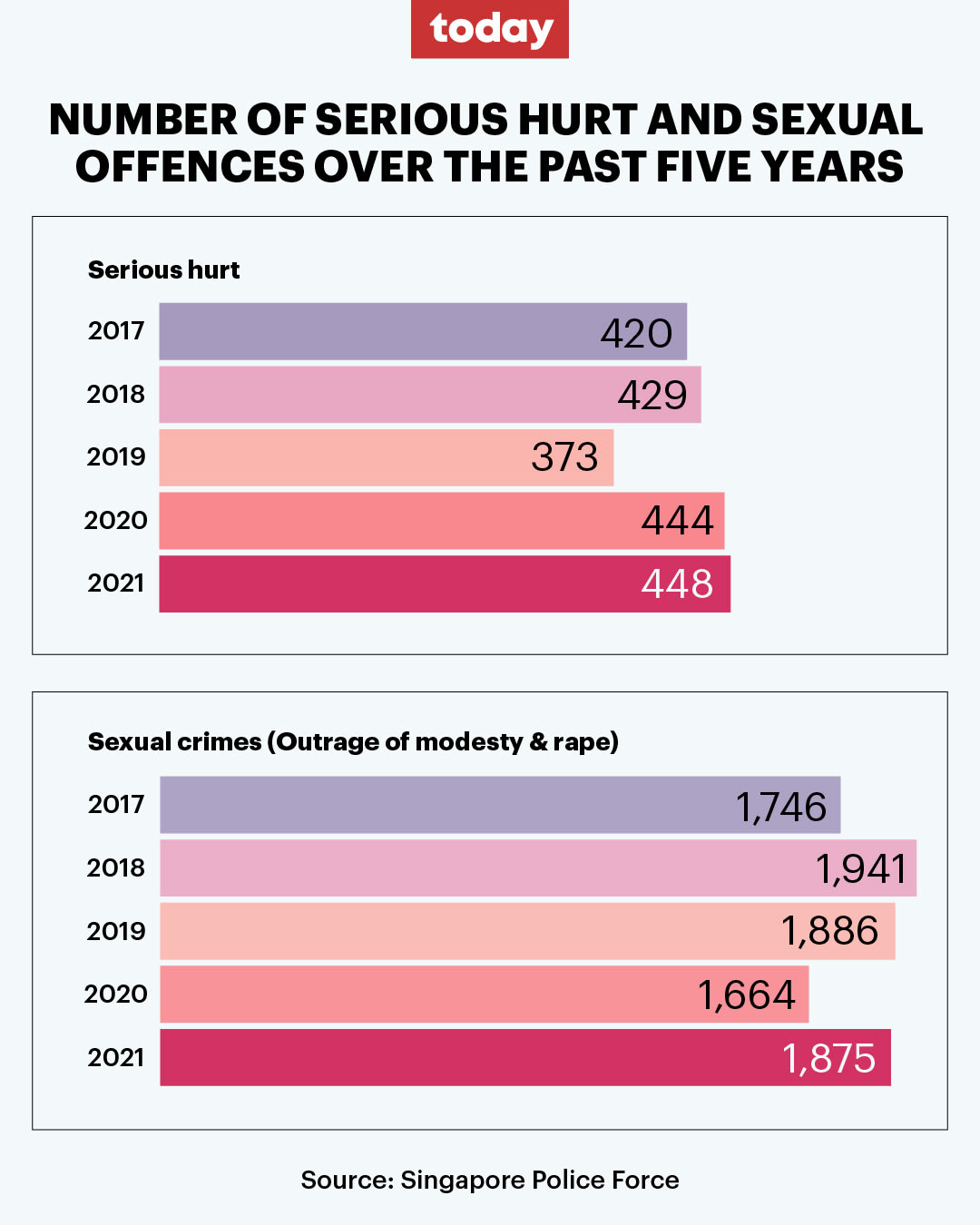Indefinite detention for serious hurt and sexual crimes: Recent cases of ex-convicts reoffending prompted review, says MHA
SINGAPORE — While the recidivism rate for criminals has generally declined over the years, the Ministry of Home Affairs (MHA) said it has observed “a number of cases in recent times” where ex-convicts of serious hurt and sex crimes reoffended not long after release from prison.

- The Ministry of Home Affairs said it has observed "a number of cases in recent times" where ex-convicts of serious hurt and sex crimes reoffended not long after release from prison
- This was what prompted a recent review of whether the courts should be allowed to sentence an offender to detention indefinitely until he is fit for release
- However, the number of serious hurt and sexual offences has generally remained stable over the past five years
- The overall rate of reoffending has also been on a decline, with the latest data showing that recidivism rates have been the lowest in nearly 30 years
SINGAPORE — While the recidivism rate for criminals has generally declined over the years, the Ministry of Home Affairs (MHA) said it has observed “a number of cases in recent times” where ex-convicts of serious hurt and sex crimes reoffended not long after release from prison.
These cases were what prompted a recent review of whether more should be done to protect the public from such dangerous offenders, MHA said on Thursday (April 14).
The ministry was replying to TODAY’s queries about an announcement in Parliament earlier this month that the Government was studying proposals to have these offenders detained until they are assessed to “no longer pose a threat” to the public, instead of being automatically released after serving their jail term.
Data from the Singapore Police Force showed that the number of serious hurt and sexual offences has generally remained stable from 2017 to 2021.
The number of serious hurt cases has ranged from 373 to 448 each year over the past five years.
For sexual crimes, which include molest and rape cases, figures have ranged from 1,664 to 1,941 per year over the five-year period.

Some legal experts had previously called for adequate safeguards if the proposal to detain dangerous offenders of serious hurt and sex crimes is eventually presented to Parliament, with one lawyer arguing that any new laws aimed at tackling this issue should be based on actual statistics on such crimes.
MHA said on Thursday that the proposed sentencing option will not affect the vast majority of offenders, who will continue to receive the usual punishment of fines or fixed terms of imprisonment, or both.
“Instead, the intent of the proposal is to provide the court with an additional sentencing option that it may consider imposing in the few cases where the offender had committed serious sexual or violent crime and is assessed to pose a high risk to public safety,” the ministry said.
By ensuring that due consideration is given to the risk that such dangerous offenders may still pose at the point of release, the public will be better protected, it added.
“We minimise the risk of someone else becoming yet another victim of the offender.”
Latest prison statistics released this year showed that the two-year recidivism rate, or the proportion of offenders detained or sentenced within two years of release for reoffending, had continued its downward trend.
Twenty per cent of inmates released in 2019 returned to prison — the lowest level since 1992 when the recidivism rate was 52.7 per cent for the cohort of inmates released in 1990.
MHA on Thursday did not provide data on reoffending rates specific to serious hurt and sexual offenders.
It did, however, provide a list of nine examples of such cases that happened since December 2018.
Among them was the case of a factory worker who sexually assaulted his 12-year-old stepdaughter within two years of his release from jail for raping his 11-year-old niece.
He had previously been sentenced to 24 years’ jail and 24 strokes of the cane, and pleaded guilty to his latest offences in March 2020.
Another case was that of serial offender Nooraman Mohd Noor, who was sentenced in November last year to four years’ jail for molesting several young males, including a 12-year-old boy, on public buses and train stations.
This was the sixth time he had been sentenced for molestation offences since 1997, having last been jailed for two years and three months in May 2019 for molesting a 31-year-old man on the train.
Others included the case of Hussain Samat, a repeat offender who was sentenced in 2018 to 20 years' preventive detention for sexually assaulting two young sisters, 12 and 16, while posing as a government inspector; and most recently, the case of Ong Wei Le who was jailed last month for 17 weeks for exposing his genitals to an 11-year-old girl whom he tried to chat up just three weeks after his release from prison.
In Parliament earlier this month, Leader of the Opposition Pritam Singh had asked for an estimate of how many current inmates could potentially come under the new regime.
In reply, Law and Home Affairs K Shanmugam said that officials were still deliberating whether it will use the current method prison officers use to assess an inmate’s risk of reoffending under the proposed changes to the sentencing regime.
“I’m unable to give the numbers. The Leader can file a separate question on that if he wishes,” Mr Shanmugam said.
MHA, when posed the same question by TODAY last week, said on Thursday that it was unable to provide an estimate as “each case will need to be assessed based on its own set of facts and circumstances, as well as the specific risks to public safety that might be posed by the offender”.











